
Exclusive Interview with Jo Ramirez
Atlas F1 Editor in Chief
The US Grand Prix this weekend will be the last one for Jo Ramirez, McLaren's team co-ordinator and a Formula One icon for four decades now. He is truly the most loved man in the F1 paddock; the secret-keeper and closest friend to some of the greatest ever drivers and team owners. He has seen it all, he's done it all. Now, at the age of 60, he wants to find out if there is a life out there, outside Formula One. Biranit Goren met Ramirez for a very emotional interview about the past and present, and heard from others who worked with him just how much he will be missed
Forty years after the Mexican first began working in Formula One, 60-year-old 'Papa Jo' is calling it a day, leaving a sport that he loved so much and so much loves him. Those who know him are still sceptical - will he really be able to leave behind the only life he's ever known? And those who don't know him, after forty years in the sport, don't know Formula One at all.
Jo Ramirez studied mechanical engineering at Mexico City University when his childhood friend Ricardo Rodriguez asked him to come with him to Europe, where he was due to drive a Ferrari in the Italian Grand Prix of 1961. "He introduced me to Ferrari's chief mechanic back then," Ramirez recalls today. "I didn't speak Italian and I had no experience. But I was lucky - they liked me and they hired me as a gopher. They didn't give me a salary but they paid for my food and for my hotel stay, and in return I'd do all the things that nobody else wanted to do, like clean the cars and the garages."
Ramirez was 20 years old back then, and he so loved racing, "although I couldn't afford to race myself," he says. Instead, he basked in the warmth of friendships he quickly made for himself with the likes of Lorenzo Bandini, Giancarlo Baghetti, Juan Manuel Fangio, and others. He would drive with them to the races, he would do the little chores for the team, and soon enough he became a part of the small family that was Formula One in the early 60s. "Life was pretty back then," Ramirez says, with a know-it-all smile. It was also full of tragedy.
Fangio, whom he met through Rodriguez, introduced him to the big bosses at Maserati, and Ramirez began working for them, where he met Giancarlo Dallara with whom he moved to Lamborghini to work on the first Lambo prototype. "Dallara said we were going to go racing afterwards so with that in mind, I joined him. But we didn't go racing, so I left after a year. But he was very good to me and I learned a lot: we did the first engine, the first chassis, the first bodywork. We put together the first GT car and I did a lot of the road testing, so I enjoyed it. But I wanted to go racing and they didn't race, so I packed up my Fiat 500 and I drove to England."
In the next five years, Ramirez would work with Ford, Dan Gurney's Eagle F1 Team as well as his racing team in the USA, and John Wyer's Automotive Gulf Porsche sportscar team. By 1972, he was very much a wanted man - a mechanic with managerial abilities, as well as leadership and charm that were priceless in whatever job he's taken. Little wonder, then, that he received an offer to join the then-best team: the team of Ken Tyrrell.
"That was one of the happiest times of my life," Ramirez says today, and talking about Tyrrell - only weeks after the Giant passed away - brings mist to his eyes.
"Ken was the most fantastic person I've ever worked with," he says. "A lovely man; he was more than a boss, he was a friend. He was one of the boys and he was so human, which is something that you don't see very often in F1. I am not saying that the present boss that I have [Ron Dennis] is not human, but now the people have more to do and there are more ambitions. Ken was just a happy racer; he loved racing and he just wanted to have a racing team and a family. He never wanted to grow up."
Did you stay in touch with him?
"Oh, definitely. All the time. I was happy I had the chance to see him a few months ago, in fact. I went to a Tyrrell reunion in April. It was the weekend before the Brazilian GP and I was supposed to fly for the GP when I heard of the reunion, so I cancelled my flight to see him. I'm so happy I did that. It was one of the last dinners that Ken went to. He was already very ill but he still had a clear mind and a good humour. He gave me a hard time, for example, on why we [McLaren] lost the Malaysian GP.
"He was a very practical man. I remember he always said to the drivers, 'Remember, the easiest thing to change in the car is the driver', so as to keep them on their toes. But you know, even so the drivers absolutely loved him. Jackie Stewart had several offers from Ferrari and other top teams to leave Tyrrell and join them, but he stayed with Ken until the end and helped him get sponsorship and get the WC yet again. Really, the fact that Jackie could have driven for anybody and elected to drive for Ken all that time should tell you what kind of an admired person Ken was."
Ramirez would become the team manager for Emerson Fittipaldi's Copersucar, move on to ATS, Shadow and Theodore, before he would join his home for the next 18 years - McLaren - in December 1983. It would become more than a working place; it would be his life. And, he would most likely be remembered as the only man in McLaren (or anywhere else for that matter) who managed to become a close friend to both Ayrton Senna and Alain Prost, even at the heyday of their rivalry on and off the track.
"You know, by the way, I remember that day very clearly because Alain was just amazing. I remember after Alain left, John Watson came in yelling, 'bloody Prost, I try as hard as I could and the bastard is still a second quicker.' Yes, Alain - very much like Ayrton - had it in him since birth, he didn't have to work hard for it. He was a quick racing driver by nature.
"Ayrton, I met for the first time when we were testing with Copersucar in Silverstone and Emerson and I were sitting there talking, when this young Brazilian came up, very shyly, to say hello to Emerson. After he left, Emerson said to me, 'watch this kid. He is going to be one of the greatest ever in the sport.' Since then, when I saw Ayrton coming into F1, I would say hello to him and ask him how he is. He was very lonely, he didn't know many people. And I think it was helpful for him to know someone, so he would always be happy to see me, he was able to speak Portuguese with me, and I'd like to think that helped him a bit. Certainly, from then on we became friends."
Prost joined McLaren shortly after Ramirez - in 1984; Senna would join the team in 1988. The two years that followed staged the fiercest duel ever in the history of Formula One, between the two best drivers of their era and among the best ever drivers in Formula One. In that rare situation, of having these two geniuses in one team, Ramirez found himself maintaining close ties with both, working with both, listening to them both. He knows, first hand, how obsessed Senna was about beating Prost from day one ("Every time he did a lap, he'd come back into the pits and ask us what was Alain's time, then go back out and do the impossible to beat it. He wouldn't rest until he had truly beaten Alain, even if it was just testing or practice!"), and he knows, first hand, how frustrated Prost had been about Honda's seeming preference towards Senna - a claim that Ramirez actually supports to some extent.
"You know, when Ayrton came to McLaren, people said that Senna was a Honda driver (because he drove with them before) and Prost was a McLaren driver," he says. "Well, Senna was the newcomer - Alain did it all already - and whether or not Honda favoured him factually? I don't know. Personally I tend to think they did. Ayrton used to spend a lot of time with Honda. He used to spend hours and hours with Honda talking about the engine, so he was more understanding of how the engine works best, and to a large extent the engine was developed based on his liking and needs. Honda were definitely working with Ayrton the way that he likes it. And Ayrton had a special way of driving - it was like he had a spring on his foot, punching the throttle very quickly. Alain tried it once, but it was impossible for him. He could not drive like that. So yes, because of the relationship, the engine suited Ayrton more than it did Alain."
How do you ask a man if he misses Senna without sounding corny. Is there anyone who loved him in his life, who admired the magical Brazilian, that still doesn't think about him every day, every minute of passing time?
"He was as a person, not just as a driver, he was very special," Ramirez says. "I often think, 'if Ayrton was here, he would have done it this way.' He was such a perfectionist, and whenever he made a mistake, he used to punish himself so much that by the time you get to him you couldn't be hard on him anymore. He was just so upset that he did make a mistake, that you couldn't tell him off because you knew that he was already in great pain about it."
Have you worked with anybody after or before him, that had the same level of commitment like him?
"No, no, without a doubt. He had the most uncanny will to win. His commitment was second to none. And, in a way I sometimes feel that is the reason why he's gone. Because he knew he would not be leading that race (in the San Marino GP) much longer - Schumacher was getting closer and closer and the car was not able to go at the speed Ayrton was asking it to. He was asking too much. For him, second is the first of the losers and he hated to be that."
The interview with Ramirez took place at the Belgian Grand Prix weekend, in a hidden corner of the Bridgestone motorhome, courtesy of the tyre manufacturer's press officer. Ramirez wanted it that way: he wanted to find some place quiet, where people won't come over every minute to say hello or ask him how he is. We sat down for almost two hours, and there were many moments of silence, many moments of hidden tears or pensive glances. No interview could encompass Ramirez's stories in full, or do his memories justice. For that, he will have to write it all down himself.
And yet, Ramirez has been in Formula One longer than any other man, barring Ecclestone perhaps. He is perhaps best qualified to compare the yesteryears to the present, and so he does.
People are saying the drivers today are not as good as those who drove in the 1980s. What do you think about that?
Do you like Schumacher? What do you think of him?
"Sometimes I love Schumacher and sometimes I hate him. He's done things in the past that I cannot believe. I will never forget him running in the back of David (Coulthard) in Spa three years ago and then storming into the pits accusing David that he tried to kill him."
But doesn't that remind you of Senna, though? He also had a temper...
"Oh, absolutely! Sometimes it was difficult to stop Ayrton - he was so volatile, so Latin. But I think it was easier to understand Senna because there was a bit more humanity inside of him. Michael is a bit more hard, more Germanic I guess. But I'm not taking anything away from Michael. He is a real racer who loves the sport and today's greatest talent. It's just such a great shame that we never saw them battling together - Schumacher and Senna. That year (1994), it started to happen and then Ayrton was gone... but you know, for Michael himself that was also devastating. When Ayrton came into the sport, he wanted to beat Prost. For Michael, it was Ayrton - he had a great admiration for him.
"I remember at Magny Cours, I can't remember which year, there was an accident at the start and Schumacher hit Senna quite badly and took him out of the race, but the race was stopped and there was a restart. Just before the restart Ayrton said, 'watch me - I am going to wait and just before he'll go into the car, I'll give him a word.' And he waited until the very last second and went to Schumacher - I don't know what he said, I wasn't close enough, but from the body language you could guess what it was, and he came back to the car very satisfied, and said 'I just got him out of balance, before the start.' You see, Senna knew that for Michael to be told off by Senna will get Michael off-balance so he used that."
What did Senna think of Michael? Did he ever tell you?
"Oh, Senna knew that Michael was a big threat for him."
He said so?
There was a feeling that Senna didn't respect Schumacher, though.
"That's not true at all. He respected him, for sure. Don't pay attention to the mind games he played - that was part of the battle. He knew Schumacher was quick, he knew this is the guy he is going to fight with, so he used mind games of course. But in private he talked about Schumacher as a real challenge."
I'm curious, Jo: who are your top five drivers ever?
"In no particular order? I would say my five best are Juan Manuel Fangio, Jim Clark, Jackie Stewart, Alan Prost and Ayrton Senna. I've been lucky to work with three of them, though, so I may be biased..."
That's actually a very good list. But tell me, do you see anybody of the current drivers that in your view maybe has something from those five people?
Ramirez thinks about this question for a few minutes, before he replies slowly, still thinking. "Schumacher... probably has the determination to win... well, not as great as Ayrton had it, but certainly the same like Prost had. I also like the class and the humility of Juan Manuel Fangio, and I see it in Mika Hakkinen. He is honest, human, calm, collected. He shows his ability on the track, he doesn't talk about it, and that's nice."
What about others?
"Maybe there are others, but I can't think of any right now," he says with a sly smile, before adding: "But I still think we are missing drivers with more charisma right now. Motor racing is not just cars and engines, it's personality. We miss the drivers that can speak their mind and say what they think, like James Hunt, or even Nigel Mansell. Something to take the piss or laugh about it. Mansell was a character and he was a racer - we don't have people like that anymore. Although mind you, I hated working with him!"
With Mansell? Why?
"Oh, god... he was undescribable. Patrick Head told me when Nigel signed with our team, 'I'm not going to tell you anything about Nigel because if I do, you wouldn't believe it. You have to see it to believe it.' And three races down the road he said to me, 'well?' and I replied: 'God have mercy on my soul.'"
But why?
"He was just... unreal. I'll give you an example from just the end of his stay: I organised a courtesy car for him, from Mercedes Benz. A brand new car that would wait for him in a small airport near Imola, when he arrives there. So I ask him, did you get your car, everything alright? He burst out! 'Did you know I had to sign for it? Do you know what it is to arrive at the airport with your own aircraft and see all the Tifosi around? Do you know what that means?' I replied, 'no, honestly I don't. I don't have my own plane and I am not a famous personality. But I've worked with a few who are and they haven't had any problems signing for a car they just received.'
"He went on and on: 'this is ridiculous! I shouldn't be expected to do this!' and I just walked off. I told Ron (Dennis), 'I can't take this anymore' - McLaren has always been a family and even if you think on the outside that we're a cold organisation, on the inside there has always been a close bond between us all - 'and I don't think there's any room for his ego here.' Sadly and happily there was no room for his size either and so he left the team."
When the last McLaren mechanic leaves Indianapolis this weekend, Jo Ramirez will hang his McLaren cap and ride on his brand new Harley Davidson - a gift from Mika and David for his 60th birthday - into the sunset and onto retirement. And albeit many, many offers to stay, he is adamant to take the leap and look for a life out there.
"When I first joined McLaren and we wanted to test, Ron would tell me 'organise it' and I'd do whatever I need to do. Now it's meetings with 10-12 people and passing memos. It's become an industry. Maybe that's not just motor racing, maybe that's true for everything in this world, we have become commercialised and industrialised. But for me, I don't like it anymore. It bothers me that I only know maybe 60% of the people in the McLaren factory. I am missing the personal touch."
So... what now?
"Oh, I will write a book - I think it will give me a little satisfaction - and I'm building a house in Spain which I'll move to with my wife." (Ramirez also has a 30 year old daughter who lives in London.)
Won't you miss it, though?
"Oh yes, I'm sure I will. But when I look at it now, when I see how many years I've been here, I also realise that I have missed the best years of my daughter's growing up, I have missed the simple things that husbands and wives do all the time. I look at Ken Tyrrell - he retired from racing and shortly after he became ill. I am afraid of that. I'm afraid of not having another life, to do other things. But maybe I'm wrong. Maybe this time next year I will be ruing the day I left and begging to come back. But I would like to have a bit of an easy life. I would like to go back to being a fan, watching the races on TV and cheering for the racers. I would like to give that a try."
And if all else fails, as Ecclestone says, "We'll work something out."
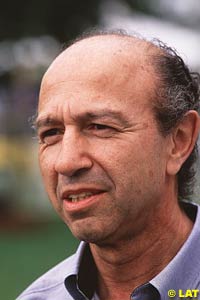 Jo Ramirez - McLaren's team co-ordinator for the past 18 years and a Formula One icon for four decades now - has a picture he carries with him, from 1973, when Tyrrell and Jackie Stewart won their third World Championship. Ramirez was working at the team back then, and the picture shows himself among some 25 scrubby-looking men carrying Ken Tyrrell on their shoulders, exhilarated with joy. "You see this?" he says, "that's the entire team, the entire Tyrrell factory. Twenty five people, and we won the Championship. And now what do you have? 450 people trying to achieve the same goal. Where did all these people come from?!?"
Jo Ramirez - McLaren's team co-ordinator for the past 18 years and a Formula One icon for four decades now - has a picture he carries with him, from 1973, when Tyrrell and Jackie Stewart won their third World Championship. Ramirez was working at the team back then, and the picture shows himself among some 25 scrubby-looking men carrying Ken Tyrrell on their shoulders, exhilarated with joy. "You see this?" he says, "that's the entire team, the entire Tyrrell factory. Twenty five people, and we won the Championship. And now what do you have? 450 people trying to achieve the same goal. Where did all these people come from?!?"
Gerhard Berger: "Jo is one of the greatest guys I know in this game. I worked with him for three years and I remember him as extremely fair, unbelievable knowledge in racing - very emotional, very Latin. I think he had the luck to work with the best drivers in the world. He has a very good sense of humour. I think it's really a pity if he leaves us, but I understand he's so long here that one day it's finished and I look forward already to his party."
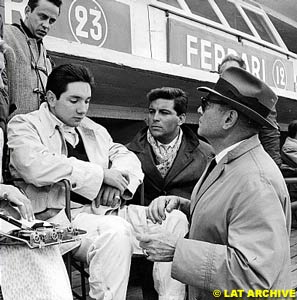 Ricardo Rodriguez was killed in the first Mexican Grand Prix in 1962, and Ramirez found himself at one of life's inevitable crossroads. "It was a point where I could go back to Mexico and continue my studies, or I could make up my mind that I am staying in Europe and this is what I will be doing from now on. I decided to stay."
Ricardo Rodriguez was killed in the first Mexican Grand Prix in 1962, and Ramirez found himself at one of life's inevitable crossroads. "It was a point where I could go back to Mexico and continue my studies, or I could make up my mind that I am staying in Europe and this is what I will be doing from now on. I decided to stay."
Alain Prost: "Jo is one of my best friends in Formula One, for sure. A very straight and honest person. To have a guy like him in an F1 team is a joy, because it's very important on the human side to have this kind of person. As a driver, he was very good to me. Particularly, it's always very good to talk to this kind of person, because you know, sometimes you need to talk to someone sympathetic in your team. And even when I had this fight with Ayrton, he was always good with both of us - he didn't show preferential treatment to either of us. He's definitely one of the persons I like the most in Formula One, and there are not too many. I will really miss him."
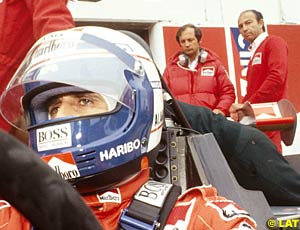 "Well, I knew Senna and Prost before they even joined McLaren and all that fight between them began," Ramirez recalls. "I met Alain when he first had a testing with McLaren. I was working for Shadow and we had a test in Paul Ricard, and that was the first time Alain had a test with the McLaren. And I happened to have a problem with one of the parts in the Shadow car, so I borrowed a piece from the McLaren team. So there I was in the McLaren truck when Alain came in to change his clothes, and we got talking.
"Well, I knew Senna and Prost before they even joined McLaren and all that fight between them began," Ramirez recalls. "I met Alain when he first had a testing with McLaren. I was working for Shadow and we had a test in Paul Ricard, and that was the first time Alain had a test with the McLaren. And I happened to have a problem with one of the parts in the Shadow car, so I borrowed a piece from the McLaren team. So there I was in the McLaren truck when Alain came in to change his clothes, and we got talking.
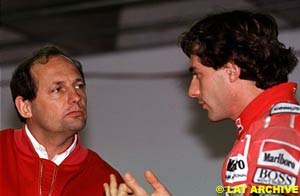 There is something almost mystical about the way Ayrton Senna left McLaren, at the end of 1993. His last race for the team, at Adelaide for the Australian Grand Prix, was an emotional one for Ramirez as well as for Senna. The two would barely look at each other without having tears in their eyes. And just before the race began, Ramirez told Senna, "you win this last one for us" - it would take McLaren to a record number of wins, surpassing Ferrari - "and we will love you forever." Senna won that race. It was his last one. After the race, he gave Ramirez his champagne soaked cap and Brazilian flag, which he picked up on the final lap, and told him, "This is yours, you earned it. I too will love you forever, Jo."
There is something almost mystical about the way Ayrton Senna left McLaren, at the end of 1993. His last race for the team, at Adelaide for the Australian Grand Prix, was an emotional one for Ramirez as well as for Senna. The two would barely look at each other without having tears in their eyes. And just before the race began, Ramirez told Senna, "you win this last one for us" - it would take McLaren to a record number of wins, surpassing Ferrari - "and we will love you forever." Senna won that race. It was his last one. After the race, he gave Ramirez his champagne soaked cap and Brazilian flag, which he picked up on the final lap, and told him, "This is yours, you earned it. I too will love you forever, Jo."
Erja Hakkinen: "Jo is the essence of the McLaren team spirit - we call him 'Papa Jo' and that's what he is, really; always taking care of everybody. He has an enormous heart - he's probably the warmest person in the whole F1 paddock. He's always in a good mood and he's always supporting everybody, even when there's hard times or problems. I can't imagine F1 without him. Everybody knew that it's gonna come one day, that he will retire, but it's sort of a sad moment because Jo belongs here, he's been here so long that he's part of the whole family - and he's such a strong part of the family, that it will be a strange feeling not to have him. But I think that he will be there. I think he can't live without Formula One; he loves it so much that it's under his skin."
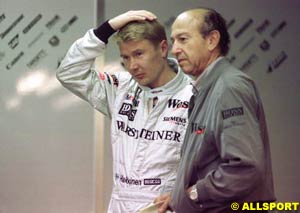 "It's very difficult to compare, but it's true to say that Michael Schumacher has won so many races and so many championships - and will continue to do so - because we have in the field a very big lapse of top drivers at the moment. Schumacher hasn't had the same competition that Senna had. Senna and Prost had to do it themselves against each other, against Mansell, against Piquet, against Rosberg. There were a lot more top drivers back then, and there were more cars in competitive levels than there are now."
"It's very difficult to compare, but it's true to say that Michael Schumacher has won so many races and so many championships - and will continue to do so - because we have in the field a very big lapse of top drivers at the moment. Schumacher hasn't had the same competition that Senna had. Senna and Prost had to do it themselves against each other, against Mansell, against Piquet, against Rosberg. There were a lot more top drivers back then, and there were more cars in competitive levels than there are now."
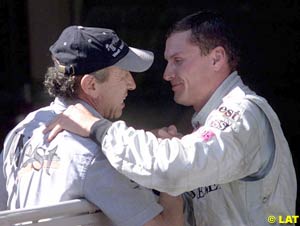 "Absolutely. He was talking about him in 1992 already. He knew back then that Schumacher will be his biggest threat. By 1994, Ayrton was getting a little desperate. We talked after the Brazilian GP (of 1994) and you could feel his desperation, you could feel he was going to Imola with a mind to do everything he could to get a win. He knew he had to get a win."
"Absolutely. He was talking about him in 1992 already. He knew back then that Schumacher will be his biggest threat. By 1994, Ayrton was getting a little desperate. We talked after the Brazilian GP (of 1994) and you could feel his desperation, you could feel he was going to Imola with a mind to do everything he could to get a win. He knew he had to get a win."
Bernie Ecclestone: "Jo has been around with us for a hundred years, and we're gonna miss Jo, because he's a part of Formula One. [But I don't think it's a retirement,] it's just a gap year. We'll see what happens, we'll see what he wants to do. When he's gone maybe he'll want to come back and we'll have a look at it. I'm sure we can work something out."
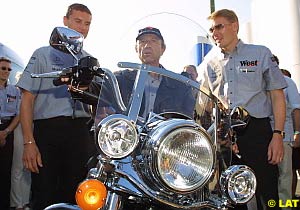 "40 years of it is enough," he explains. "Things have changed so much, you know? For me it has always been my hobby and I loved doing it too much. But now it's beginning to be a job, and I think it's enough. There is no more the satisfaction that I had before. There were 64 employees at McLaren when I joined them in 1984. We are now 450. I ask myself all the time: in all that time since, the goal hasn't changed. We're still taking two cars to every Grand Prix for 16 or 17 races a year. That hasn't changed. So where do all these people come into play?
"40 years of it is enough," he explains. "Things have changed so much, you know? For me it has always been my hobby and I loved doing it too much. But now it's beginning to be a job, and I think it's enough. There is no more the satisfaction that I had before. There were 64 employees at McLaren when I joined them in 1984. We are now 450. I ask myself all the time: in all that time since, the goal hasn't changed. We're still taking two cars to every Grand Prix for 16 or 17 races a year. That hasn't changed. So where do all these people come into play?
Please Contact Us for permission to republish this or any other material from Atlas F1.
|
Volume 7, Issue 39
Atlas F1 Exclusive
Exclusive Interview with Jo Ramirez
Articles
Phil Hill: Made in America
Picture Perfect
United States GP Preview
The United States Grand Prix Preview
Technical Preview: Indianapolis
Columns
Elsewhere in Racing
The US Grand Prix Circuit Trivia Quiz
Bookworm Critique
The Weekly Grapevine
> Homepage |